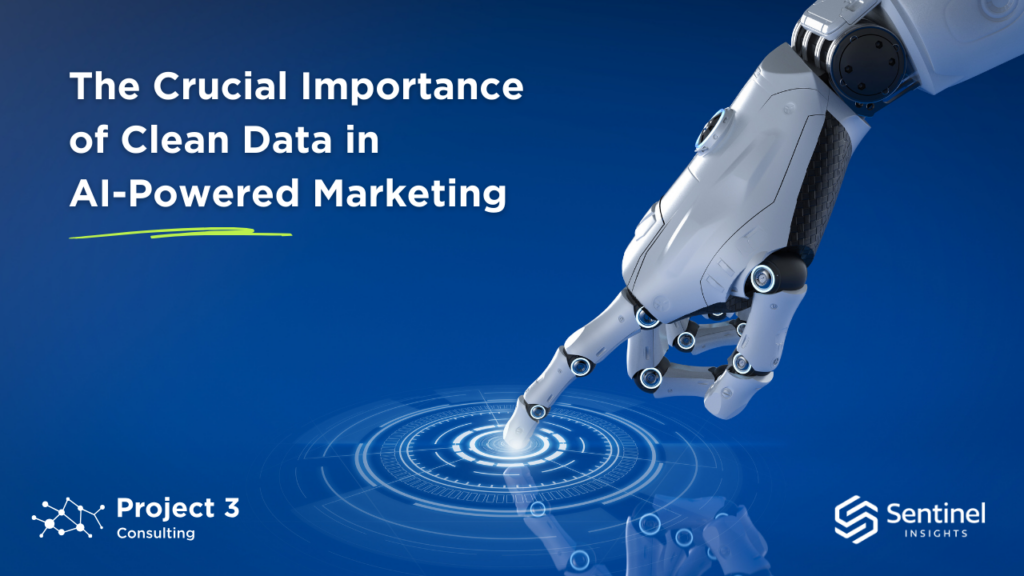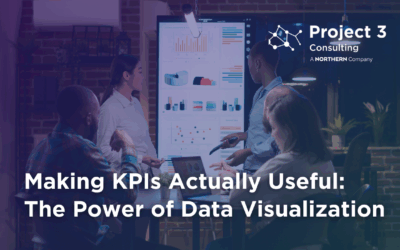
Created in partnership with Sentinel Insights
Have you ever wondered how some companies always seem to be ahead of the game in digital marketing? The answer lies in their ability to adapt and continually seek innovative strategies. With artificial intelligence (AI) making gigantic waves in digital marketing, there’s been a major shift towards more agile and efficient strategies. After all, what makes a better partner than a machine that can generate data, content, and graphics in a matter of seconds?
But here’s the catch: the success of AI-driven marketing really hinges on the quality of the data you’re using. At Project 3, we know just how crucial clean first-party data is for hitting those marketing home runs and building trust in the digital marketing community. That’s why we’ve teamed up with Sentinel Insights to help you understand the importance of clean data when utilizing AI in your digital marketing programs.

Why Clean First-Party Data Matters
Clean, consented first-party data is the cornerstone of any great marketing strategy. It helps you make smart decisions and connect with your audience more effectively. Here’s why clean data is so important:
- Accuracy: Clean data ensures the accuracy of marketing efforts, minimizing errors and maximizing campaign effectiveness. Remember, AI is only as smart as the data it uses.
- Compliance Assurance: With strict data privacy rules like GDPR and CCPA, staying compliant is a must. Clean, well-governed data collection helps you follow these rules and avoid any hiccups.
- Reliability: Trust is everything in customer relationships. Reliable data builds trust by providing consistent and relevant experiences for your audience.
- Efficiency: Clean data streamlines your processes and helps you use your resources wisely to get the best ROI.
That covers clean data, but why does first-party data matter?
- Builds Trust: First-party data is obtained directly from your audience, whether through interactions on your website, social media, or email campaigns. This direct relationship fosters trust as customers know they are engaging with your brand on their terms.
- Higher Quality: The quality of first-party data is generally superior to third-party data because it is specific to your audience. This data includes insights into customer behaviors, preferences, and purchase history, enabling more personalized and effective marketing strategies. With first-party data, you have a clearer picture of your customer’s journey, leading to more accurate targeting and messaging.
- Future-Proofing Against Third-Party Cookie Deprecation: As major browsers phase out support for third-party cookies, relying on first-party data becomes more crucial. You can future-proof your marketing strategies by building robust first-party data collection practices now, ensuring you can continue to deliver personalized experiences without relying on third-party data.
- Enhanced Customer Insights: First-party data provides direct insights from your customers, allowing you to understand their needs and preferences better. This data is invaluable for creating tailored marketing campaigns, improving customer experience, and driving higher engagement and conversion rates.
- Data Ownership and Control: With first-party data, you have full control over the data you collect. This means you can ensure its accuracy, relevance, and timeliness. Having control also allows for better data management practices, including secure storage and proper usage, reinforcing your compliance with data protection regulations.
- Improved ROI: First-party data can significantly enhance the return on investment of your marketing efforts and marketing technologies you’re using. By leveraging accurate and relevant data, you can create more effective campaigns, reduce wasted spend, and improve overall marketing performance. This efficiency translates into better resource allocation and higher profitability.
Stay Ahead with MarTech Monitoring
Regular audits are essential for assessing the health of your marketing technologies, but they can quickly become outdated. Project 3 Consulting excels at performing tag management and analytics audits, providing valuable point-in-time insights into your MarTech ecosystem. However, given the complexity and rapid evolution of websites and digital marketing strategies, relying solely on periodic audits may leave gaps in your data quality management.
That’s where a monitoring solution like Sentinel Insights comes into play. Sentinel Insights offers always-on MarTech monitoring to ensure your data remains clean and trustworthy between audits. This proactive approach helps you catch issues early and maintain high digital data quality standards. Real user monitoring ensures that your users’ consent preferences are honored, 100% of the time. For more on why monitoring is crucial alongside regular audits, check out this blog post.
By combining regular audits with ongoing monitoring, you can stay ahead of the curve, keeping your marketing technologies and data collection practices in top shape. These proactive steps will ensure that your AI models are trained on good data, your customers receive the information that suits them best, and your digital marketing strategies are based on trustworthy information.
Using AI to Supercharge Your Marketing Efforts
The convergence of AI and marketing has opened up a whole new world of possibilities. Now that your data is in good shape and you can trust that it’s being monitored, here’s how you can begin to use AI to boost your marketing strategies:
- Predictive Analytics: AI-powered predictive analytics let you foresee customer behavior, spot trends, and create personalized experiences on a large scale.
- Dynamic Content Optimization: AI lets you adjust your content in real-time based on dynamic insights, so you can send highly targeted messages to your audience.
- Automated Campaign Management: AI handles routine tasks like testing different strategies, segmenting your audience, and optimizing campaigns, giving you more time to focus on big-picture strategies.
- Sentiment Analysis: AI-driven sentiment analysis tools enable marketers to gauge audience sentiment and tailor messaging accordingly, fostering deeper connections with consumers.
Use Case: Enhancing a Clothing Shop’s Digital Marketing with AI and Clean Data

Let’s bring this to life with a real-world example. Imagine a trendy clothing shop, ChicWear, looking to boost its online presence and sales. ChicWear has a diverse customer base and wants to deliver personalized shopping experiences to increase customer engagement and loyalty.
Here’s how they can utilize AI and clean data to achieve their goals:
- Data Quality Assessment: ChicWear starts by conducting a thorough data quality assessment. They work with Project 3 Consultants and implement the Sentinel Insights tag on their website to audit and monitor their first-party marketing data collection. This is done to ensure their web analytics are accurate, up-to-date, and trustworthy. This clean first-party data forms the foundation for all their marketing efforts.
- Predictive Analytics: With clean data in place, ChicWear leverages AI-powered predictive analytics to understand customer behavior and anticipate future trends. For instance, they analyze past purchase data to identify popular items and predict which styles will be in demand. This insight helps them stock the right inventory and create laser-focused marketing campaigns.
- Dynamic Content Optimization: ChicWear uses AI algorithms to dynamically optimize their online content. As customers browse their website, AI analyzes real-time data to customize the shopping experience. For example, if a customer frequently buys athleisure wear, the website will highlight new arrivals in that category, suggest matching accessories, and offer personalized discounts.
- Automated Campaign Management: AI automates ChicWear’s email marketing campaigns. Based on customer data, AI segments their audience and sends personalized emails. For instance, customers who bought winter coats last year receive early access to this season’s collection. Customers who leave an item in their cart automatically receive a reminder to check out before personalized offers expire. Additionally, AI conducts A/B testing to determine the most effective email subject lines and content, continuously optimizing for better engagement rates.
- Sentiment Analysis: ChicWear uses AI-driven sentiment analysis to monitor social media and customer reviews. By understanding how customers feel about their products and brand, they can tailor their messaging and respond proactively to feedback. If sentiment analysis reveals that customers love a particular new item, ChicWear can feature it more prominently in their marketing campaigns.
Results: By utilizing AI and clean data, ChicWear experiences several benefits:
- Increased Sales: Personalized recommendations and targeted campaigns drive higher conversion rates.
- Improved Customer Engagement: Customized shopping experiences make customers feel valued, increasing loyalty and bringing in more referrals.
- Efficient Operations: AI automates time-consuming tasks, allowing the marketing team to focus on strategy and creativity.
- Better Inventory Management: Predictive analytics help ChicWear stock the right products, reducing overstock and stockouts.
Moving Forward with Confidence
Clean first-party data is the key to making AI-driven marketing work for you. By focusing on data quality and using AI effectively, you can gain amazing insights, enhance customer experiences, and drive growth.
At Project 3, along with Sentinel Insights, we’re dedicated to helping you gain confidence in your data so that you can maximize your use of innovative tools like AI. Join us in setting the standard for real-time MarTech data monitoring, and let’s move forward together with accuracy, reliability, and peace of mind. Contact us today to start transforming your digital marketing strategy with the power of clean data and AI.




